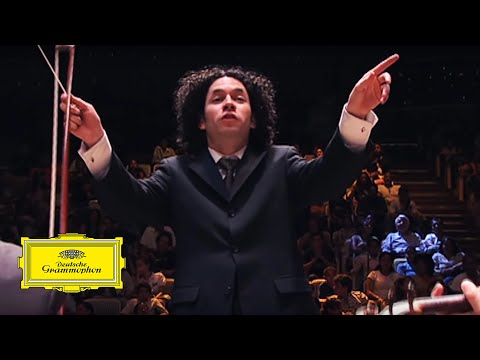It’s still early in February, but classical music has already seen two major conducting appointments this month. On February 1, Israeli conductor Lahav Shani signed a contract to become the new music director of the Munich Philharmonic from the 2026-27 season, replacing Putin cheerleader Valery Gergiev. On Tuesday, the New York Philharmonic announced that Gustavo Dudamel, currently the music director of the Los Angeles Philharmonic, would be its new leader starting the same season, following Jaap van Zweden. Both Shani and Dudamel are good musicians and will be assets to their new orchestras. Both are also safe choices whose impact on the repertoire will probably be limited. Although Susanna Mälkki and Mirga Gražinytė-Tyla were reportedly considered for the positions at various points, both orchestras ended up choosing men.
Shani is the lesser-known of the two. Age 34, he’s the son of a choral conductor; a pianist by training, he played bass in the Israel Philharmonic Orchestra, performed solo with the group on the piano, and served as Zubin Mehta’s assistant and as a guest conductor before being appointed music director in the 2020-21 season. (His first full-time appointment came in 2018, with the Rotterdam Philharmonic Orchestra, a post he will be giving up for Munich. Shani will remain music director of the IPO.)
Shani is very popular in Tel Aviv. Around 2013, he conducted a memorable performance of Mahler’s Symphony No. 1 with the IPO: “I remember the people around me enjoying a breath of fresh air with this piece that they are so familiar with,” said Sharon Cohen, a violinist with the orchestra. “He looks for the meaning in the original text, in the way it’s written, and he brings it to life in a very honest way.” Cohen added, “I love working with him.”
Michael Seltenreich, an Israeli composer who grew up on the same street and went to the same high school as Shani, has many friends in the IPO. “I think he’s very well loved” in the orchestra, Seltenreich said. He noted Shani’s preternatural musical ability: the conductor can play any massive score from the piano, transpose in real time, and hear both a single voice and the overall structure of a symphony at the same time.
Shani is a musician’s musician. Like Alan Gilbert, whose parents were both in the New York Philharmonic that he later led, Shani was practically raised by the IPO. “There was, at least in the beginning, this kind of tension between ‘OK, this is our child, and now he’s also our boss,’” said Seltenreich. As the Munich-based Süddeutsche Zeitung noted, the Munich Philharmonic players use the informal Du rather than the formal Sie with Shani—a fact that would be meaningless in most contemporary workplaces, but that still holds weight in the orchestra world. It’s a positive sign for the Munich musicians and German orchestra workplace culture in general that Shani probably won’t become the kind of dictatorial boss personified by another one of his famous mentors, Daniel Barenboim.
Shani’s appointment is less promising for the most curious audiences (not Munich’s reputation). The Israel Philharmonic is a conservative, traditional orchestra, which may be part of the reason Shani is such a good fit there. Shani hasn’t made many recordings yet, but his version of Beethoven Symphony No. 7 with the Rotterdam Philharmonic is gnawingly average, showing no trace of the vigor and bite that early music-informed conductors have brought to the same repertoire. Shani has also recorded Paul Ben-Haim’s Symphony No. 1 with the IPO, a 1940 work in a Mahlerian vein undoubtedly worth introducing to European audiences. But revealing underplayed repertoire and premiering contemporary music are very different things, and Shani doesn’t have much of a record in the latter.
The SZ, reporting from the Munich Philharmonic’s press conference, noted Shani’s intention to perform 20th and 21st century repertoire alongside “preserving the orchestra’s tradition of Mahler and Bruckner” (it’s revealing that the 20th century had to be explicitly mentioned). Shani’s previous tenures give those wanting to hear new orchestral music in Munich little to go on, with no clear aesthetic direction emerging.
Maybe the Munich Philharmonic doesn’t see contemporary music as a major part of its remit, considering it shares the city with the excellent and more adventurous Bavarian Radio Symphony Orchestra. Still, in an ideal world, Shani could lead historical Israeli repertoire and exciting contemporary music alongside the Munich Philharmonic’s favored Mahler and Bruckner, enriching the city and the country’s musical life in the process.
Despite his prodigious talents and pleasant management style, there is something conservative about Shani: He’s a 34-year-old man who likes to smoke cigars. In the mostly ecstatic media coverage of Shani’s appointment in Munich (and, incidentally, Klaus Mäkelä’s in Amsterdam), the conductor’s relative youth has frequently been emphasized. But it’s not the age alone that makes a young conductor interesting. It’s also the qualities of youth: brashness, energy, a willingness to dispense with both aesthetic and cultural pieties. In that sense, it’s not yet clear how youthful Shani’s tenure will be.
The latest from VAN, delivered straight to your inbox
At the beginning of his career, Gustavo Dudamel’s youthful energy was unquestionable. With his extremely busy schedule, Dudamel has seemed a little less boisterous in recent years. At the New York Philharmonic, the next question is whether Dudamel’s energetic interpretations can turn into something more mature without sacrificing intensity. First, the players of the New York Philharmonic probably don’t want to stand up and dance while they play (for good reason, as they might look a tad more awkward than the members of the Simón Bolívar Youth Orchestra). In more standard repertoire, too, Dudamel has a tendency toward aesthetic fireworks that can be exhausting. A few years ago in Berlin, I saw him lead Stravinsky’s “Petrushka” and “Rite of Spring” in the same program, playing both pieces very loud and very fast. After the concert, I felt like I’d run a marathon—and I’d only listened.
On Tuesday, the Times asked, “Will Dudamel be New York’s Next Bernstein?” Politically at least, he won’t. Bernstein was a big-hearted mensch whose extravagant concern for the plights of others led him into some embarrassing situations. Dudamel prefers an icy reserve that, in the long run, can be more damaging. Between 2014 and 2017, he refused to comment on the political crisis enveloping Venezuela, probably due to the funding his projects received from disgraced president Nicolás Maduro. In May 2017, Dudamel finally made a Facebook post criticizing the leader, after a young violinist was killed by the Venezuelan National Guard. According to Geoff Baker, an expert on the Venezuelan music education program El Sistema, Dudamel has since “returned to the position he held for a decade before 2017—avoiding political discussion.” The conductor’s appointment as music director of the New York Philharmonic “confirms that the classical music world cares little about Dudamel’s closeness to autocrats or the ever-widening holes in the El Sistema myth that provides his backstory,” Baker said. “So much for a supposed ethical turn in classical music after #MeToo and Black Lives Matter. It’s business as usual: see no evil, hear no evil.”
In California, Dudamel, alongside former Los Angeles Philharmonic and New York Philharmonic artistic director Deborah Borda, earned praise for programming more contemporary music than is common for major American orchestras. In this area, Dudamel’s reputation surpasses Lahav Shani’s. With one caveat: The music of John Adams makes up a large part of Dudamel’s contemporary repertoire, and while Adams is undoubtedly alive, performing his pieces shouldn’t guarantee full new music street cred. Adams is as safe as it gets in contemporary music; as George Grella wrote in VAN in 2018, “If his music up through the early 21st century was generous, his work since then has become the equivalent of a crank yelling at the kids to get off his lawn.” Adams’s music is tonal, melodic, and bluntly politically progressive, blessed with every institutional seal of approval a classical composer can possibly earn.
Not every piece of new music is equally bold for a conductor to lead. Thomas Adès and John Williams, whose music Dudamel has also been praised for recording, aren’t exactly up-and-coming experimentalists either. David Robertson, Ilan Volkov, Vladimir Jurowski, Susanna Mälkki, even Teodor Currentzis are conductors who are willing to risk their audience’s boredom, even displeasure with their programs. That’s how it should be.
Both Shani and Dudamel are safe choices. Musicians and audiences feel comfortable with them. Unfortunately, challenging programs will probably be rare. And, as mentioned, there’s another comfortable aspect of these choices: both Shani and Dudamel are men. That’s not their fault, of course, but both the Munich and New York Philharmonics had a chance to generate real enthusiasm and momentum by nominating a woman music director. We’re stuck with the fantasy of “Tár,” while these great, real orchestras stay in safe hands. ¶
Subscribers keep VAN running!
VAN is proud to be an independent classical music magazine thanks to our subscribers. For just over 10 cents a day, you can enjoy unlimited access to over 875 articles in our archives—and get new ones delivered straight to your inbox each week.
Not ready to commit to a full year?
You can test-drive VAN for one month for the price of a coffee.



